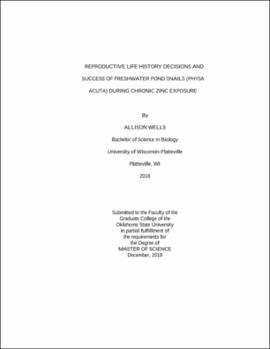| dc.contributor.advisor | Luttbeg, Barney | |
| dc.contributor.author | Wells, Allison | |
| dc.date.accessioned | 2020-06-29T17:39:38Z | |
| dc.date.available | 2020-06-29T17:39:38Z | |
| dc.date.issued | 2019-12 | |
| dc.identifier.uri | https://hdl.handle.net/11244/324920 | |
| dc.description.abstract | Life history theory examines how individuals should make trade-offs between current reproductive effort and survival to achieve future reproductive gains. A prediction is that as future life expectancy decreases, individuals should invest more in current reproduction at the cost of lower survival and future reproduction. Although P. acuta have been shown to display a relatively high tolerance to anthropogenic contaminants and pollutants, research regarding sub-lethal chronic exposure to contaminants and reproductive effort is limited. However, it has been shown that higher zinc concentrations lower P. acuta survival rates. Therefore, the objective of this study was to determine if chronic sub-lethal exposure to zinc has the potential to alter an individual's reproductive life history decisions, and if the magnitudes of these decisions are dependent upon a site's historic zinc exposure. Snails were collected from 3 sites within the Grand Lake watershed that have different zinc concentrations. Their offspring were then exposed to one of 5 zinc concentrations over the course of ~18 weeks. Individuals from these sites showed differences in response to zinc treatments. Individuals from historically moderate zinc concentrations followed life history predictions most closely, as an increase in zinc treatment resulted in earlier timing of reproductive events and growth. However, individuals from historically low zinc exposure showed delayed growth and reproduction as zinc concentration increased. Individuals from high historic zinc exposure in general displayed few negative effects from the zinc treatments, likely due to a high zinc tolerance among these individuals. Overall, results showed evidence of a gradient of local adaptation and tolerance of zinc. Tolerance seemed to be a key factor in whether individuals make life history changes in response to metal contamination. | |
| dc.format | application/pdf | |
| dc.language | en_US | |
| dc.rights | Copyright is held by the author who has granted the Oklahoma State University Library the non-exclusive right to share this material in its institutional repository. Contact Digital Library Services at lib-dls@okstate.edu or 405-744-9161 for the permission policy on the use, reproduction or distribution of this material. | |
| dc.title | Reproductive life history decisions and success of freshwater pond snails (Physa acuta) during chronic zinc exposure | |
| dc.contributor.committeeMember | Towner, Mary | |
| dc.contributor.committeeMember | Belden, Jason | |
| osu.filename | Wells_okstate_0664M_16604.pdf | |
| osu.accesstype | Open Access | |
| dc.type.genre | Thesis | |
| dc.type.material | Text | |
| dc.subject.keywords | life history | |
| dc.subject.keywords | physa | |
| dc.subject.keywords | reproduction | |
| dc.subject.keywords | tolerance | |
| dc.subject.keywords | zinc | |
| thesis.degree.discipline | Integrative Biology | |
| thesis.degree.grantor | Oklahoma State University | |
